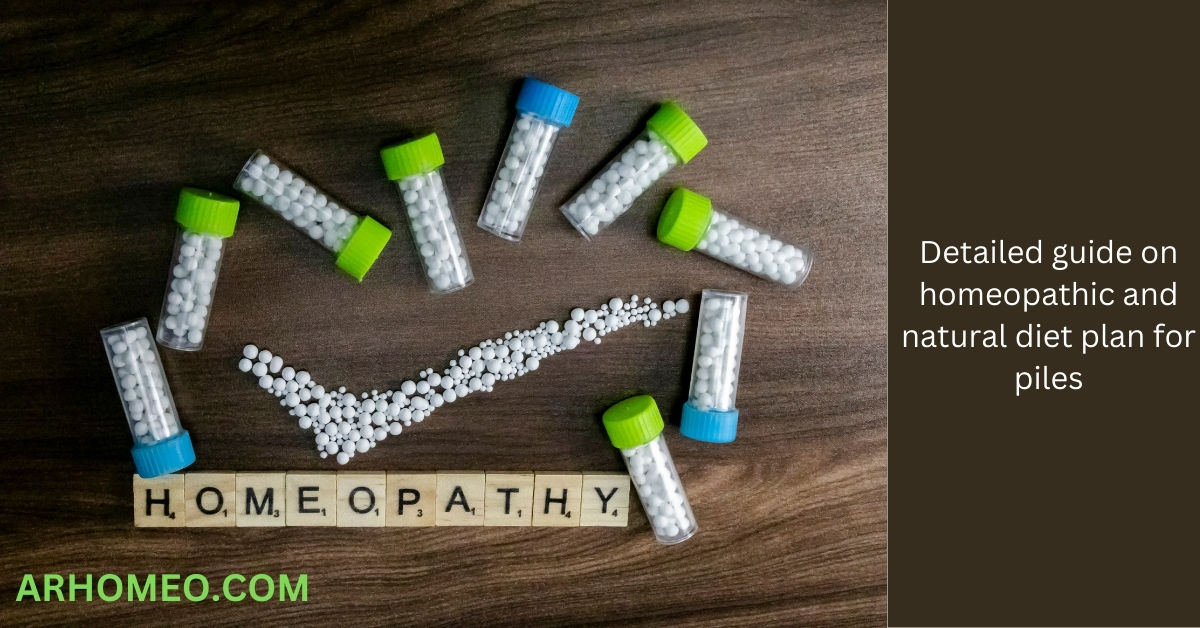Piles, or hemorrhoids, can be an uncomfortable and distressing condition, but managing it through a thoughtful diet can offer significant relief. This guide explores the benefits of a homeopathic and natural approach to alleviating piles. By incorporating specific dietary changes and natural remedies, you can help reduce inflammation, improve digestion, and promote overall well-being. Here, we delve into practical strategies and holistic solutions to support your health and ease the symptoms associated with piles.
Diagnosed with piles?
If you’ve been diagnosed with piles, you’re not alone. This common condition affects many people and can cause discomfort and inconvenience. Thankfully, adopting a tailored approach to your diet and lifestyle can make a significant difference. By focusing on natural remedies and dietary adjustments, you can manage symptoms more effectively and enhance your overall comfort. This guide provides practical tips and insights to help you navigate your way to relief and better health.
Homeopathic medicine: How much time does it need?
The time it takes for homeopathic medicine to show results can vary widely from person to person. Generally, improvements may be noticed within a few weeks, but some individuals might take several months to experience significant relief. Homeopathy works by stimulating the body’s natural healing processes, so patience is key. Consistent use, along with guidance from a qualified practitioner, can help you achieve the best outcomes and manage your symptoms effectively.
How does homeopathy treatment work on the body?
Homeopathy operates on the principle of “like cures like,” where highly diluted substances are used to stimulate the body’s innate healing mechanisms. These remedies work by enhancing the body’s natural defense responses, encouraging it to address imbalances and symptoms from within. Unlike conventional treatments that target specific ailments directly, homeopathy aims to promote overall well-being by addressing the underlying causes of health issues and restoring harmony to the body’s systems.
Diet plan that’s beneficial for piles
A diet plan beneficial for piles focuses on increasing fiber intake to promote smooth bowel movements and prevent constipation. Include plenty of fruits, vegetables, whole grains, and legumes in your meals. Staying hydrated is equally important, so drink ample water throughout the day. Avoid spicy foods, excessive caffeine, and alcohol, which can irritate the digestive system. Incorporating these dietary adjustments can help reduce inflammation, ease discomfort, and support overall digestive health.
Most common risk factors and causes of piles
The most common risk factors for piles include chronic constipation, prolonged sitting, and straining during bowel movements. Pregnancy and childbirth can also increase the risk due to pressure on the rectal veins. Other contributing factors are a low-fiber diet, obesity, and genetic predisposition. Lifestyle habits, such as heavy lifting and sedentary behavior, can exacerbate the condition. Addressing these risk factors through diet and lifestyle changes can help manage and prevent piles.
5 tips to look for a homeopathic doctor:
- Check the Overall Years of Experience
When seeking a homeopathic doctor, experience matters. Look for practitioners with a substantial number of years in the field, as this indicates a deep understanding of various conditions and treatments. Experienced doctors have encountered a wide range of cases and are likely to provide more nuanced and effective care. Their seasoned perspective can be invaluable in tailoring treatments to your specific needs. - Ensure Proper Training
A well-trained homeopathic doctor should have completed accredited educational programs and training in homeopathy. Verify their credentials and certifications to ensure they have received comprehensive education in this specialized field. Proper training ensures that the doctor is knowledgeable about the principles and practices of homeopathy and can apply them effectively to your treatment. - Understanding of Advanced Homeopathic Treatment
Homeopathy is a constantly evolving field with ongoing advancements and research. Choose a doctor who stays updated with the latest developments and techniques in homeopathic treatment. An understanding of advanced treatments and modern approaches can significantly enhance the quality of care and improve the likelihood of successful outcomes for your condition. - Provide One-on-One Session for Initial Consultation
A personal consultation is crucial for establishing a good rapport and ensuring that the treatment plan is tailored to your specific needs. During this initial session, the doctor should take the time to understand your health history, discuss your symptoms, and address any questions you may have. This personalized approach helps in creating a more effective and individualized treatment strategy. - Check Reviews or Testimonials
Researching reviews or testimonials from previous patients can provide valuable insights into the doctor’s reputation and effectiveness. Look for feedback on their approach, communication skills, and overall satisfaction of past patients. Positive reviews and endorsements can give you confidence in the doctor’s ability to provide quality care and successful treatment outcomes.
FAQ
What is the Diet Chart for Piles Patients?
A diet chart for piles patients should focus on high-fiber foods to ease bowel movements and prevent constipation. Include a variety of fruits like apples and berries, vegetables such as leafy greens and carrots, and whole grains like oats and brown rice. Incorporate legumes and nuts for added fiber. Drink plenty of water throughout the day to stay hydrated. Avoiding processed foods and those high in sugar can also be beneficial for managing symptoms.
Which Food is Best for Piles Patients?
Foods rich in fiber are ideal for piles patients as they help prevent straining during bowel movements. Opt for fruits such as pears and oranges, which are high in soluble fiber. Vegetables like spinach and broccoli, whole grains like quinoa and barley, and legumes such as lentils and beans are also excellent choices. These foods aid digestion and promote regularity, reducing the discomfort associated with piles.
What to Avoid During Piles?
During piles, it’s essential to avoid foods that can irritate the digestive system or contribute to constipation. Steer clear of spicy foods, which can exacerbate inflammation and discomfort. Minimize intake of alcohol and caffeine, as they can dehydrate and worsen constipation. Processed and fatty foods should also be avoided, as they can slow digestion and contribute to bowel irregularities, making piles symptoms worse.
What is the Best Medicine for Piles?
The best medicine for piles depends on the severity and specific symptoms experienced. For mild cases, over-the-counter topical treatments like hemorrhoid creams can provide temporary relief. For more severe cases, prescription medications or homeopathic remedies might be recommended. It’s crucial to consult a healthcare provider to determine the most appropriate treatment based on individual needs and the nature of the piles.
Is Chicken Bad for Piles?
Chicken itself is not inherently bad for piles, but the way it is prepared and consumed can make a difference. Opt for lean, skinless chicken cooked without excessive fat or spices. Chicken can be part of a balanced diet, but be cautious of fried or heavily seasoned preparations that might irritate the digestive system. It’s essential to maintain a diet rich in fiber and to avoid constipating foods alongside consuming chicken.
Is Yogurt Good for Piles?
Yogurt can be beneficial for piles patients due to its probiotic content, which supports healthy digestion and regular bowel movements. Probiotics help maintain a balanced gut flora, potentially easing symptoms of constipation and promoting overall digestive health. Opt for plain, unsweetened yogurt to avoid added sugars, which can contribute to digestive issues. Including yogurt in a high-fiber diet can help manage piles symptoms effectively.
Conclusion
Managing piles effectively involves a holistic approach that combines homeopathic remedies with a well-structured natural diet. Homeopathy focuses on stimulating the body’s own healing processes through highly diluted substances, tailored to your individual symptoms and overall health. This gentle approach can provide relief and support long-term wellness when guided by an experienced practitioner.
Complementing homeopathic treatment with a thoughtful diet is crucial for managing and preventing piles. A diet rich in fiber from fruits, vegetables, whole grains, and legumes can alleviate constipation, a primary contributor to piles. Staying well-hydrated by drinking plenty of water and avoiding irritants like spicy foods, caffeine, and alcohol further supports digestive health.
By integrating these homeopathic and dietary strategies, you can address the underlying causes of piles and improve your overall quality of life. Patience and consistency are key, as results may vary and may take time to manifest. Always consult with healthcare professionals to tailor treatments to your specific needs and ensure a comprehensive approach to managing and alleviating piles.

